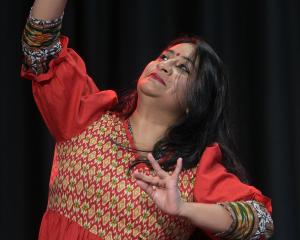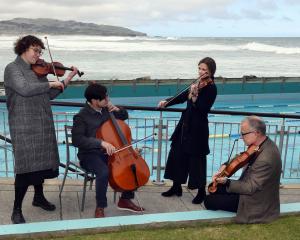There will be weird stuff going on in St Paul's Cathedral during the Arts Festival, George Chittenden tells Charmian Smith.

''The Cathedral choir puts on several concerts a year but it normally falls within our traditional sphere of choral music, so we thought something a bit different - and not only different but really, really outlandish. It's going to be really eye-opening and push the choir's boundaries and push the boundaries of what it means coming to a concert in what people think of as a liturgical space,'' he said.
One of the works will be Hungarian Gyorgy Ligeti's 16-part Lux Aeterna (Eternal light) which was used in Stanley Kubrick's 1968 film 2001: A Space Odyssey.
''It's just a wall of meditative sound and atonal.
''He is experimenting with sounds and his music is extremely strange to listen to in some ways - very dark.''
Swedish composer Bengt Hambraeus' Motetum Archangeli Michaelis, about St Michael and all angels, is liturgical but would be very difficult to do in a liturgy, he said.
''It has this huge gothic organ part, then passages that involve shouting and screaming of the choir - some really evocative descending into hell-style passages, then something contrasting and very quiet and ethereal and heavenly at the end.''
The choir will also sing Estonian composer Urman Sisask's semi-melodic, minimalist work Oremus.
Chittenden has written a new piece for the concert, Pingstborn which means Pentecost prayer in Swedish, in honour of his Swedish heritage.
''It uses one piece of Gregorian chant, Veni creator and turns the piece into a huge 13-minute canon or round for 10 choral parts on this theme. I'm going to experiment with the singers being in different parts of the cathedral and it will be a massive wash of sound,'' he said.
He plans to accompany the concert with a light show highlighting various parts of the cathedral's architecture.
He will also play an organ piece, De profundis, written for him in 2005 by Paul Mealor, a friend when he was at university in Aberdeen.
Mealor came to fame when he was commissioned by Prince William to write a motet, Ubi Caritas et Amor, for his marriage to Catherine Middleton at Westminster Abbey in 2011.
''De profundis inadvertently feels like the onset of an earthquake, standing on the bottom four pedal notes with the lowest register of stops at the same time and building up over 10 minutes to create this huge wall of sound, then dying away with just one major chord in the background,'' he said.
Also performing will be Puspawarna, the University of Otago Gamelan, and STRORK, an improvisational string group which will perform an improvisation together and also perform other pieces, including The Ruins sing to us and Fylfot by Alan Starrett.












